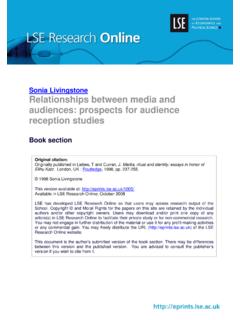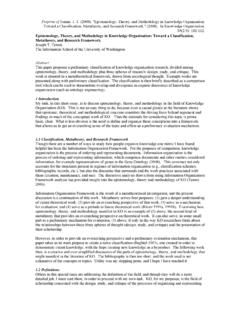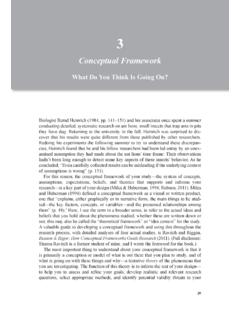Transcription of Minas N. Kastanakis, Benjamin G ... - LSE Research Online
1 Minas N. Kastanakis, Benjamin G. Voyer The effect of culture on perception and cognition : a conceptual framework Article (Accepted version). (Refereed). Original citation: Kastanakis, M. and Voyer, Benjamin G. (2014) The effect of culture on perception and cognition : a conceptual framework. Journal of Business Research , 67 (4). pp. 425-433. ISSN 01482963. DOI: 2013 Elsevier Inc. This version available at: Available in LSE Research Online : March 2014. LSE has developed LSE Research Online so that users may access Research output of the School. Copyright and Moral Rights for the papers on this site are retained by the individual authors and/or other copyright owners.
2 Users may download and/or print one copy of any article(s) in LSE Research Online to facilitate their private study or for non-commercial Research . You may not engage in further distribution of the material or use it for any profit-making activities or any commercial gain. You may freely distribute the URL ( ) of the LSE. Research Online website. This document is the author's final accepted version of the journal article. There may be differences between this version and the published version. You are advised to consult the publisher's version if you wish to cite from it. 1. The effect of culture on perception and cognition : a conceptual framework Minas N.
3 Kastanakisa, ESCP Europe Business School Benjamin , ESCP Europe Business School & London School of Economics and Political Science a (Corresponding author) Assistant Professor of Marketing, ESCP Europe Business School, 527 Finchley Road, Hampstead, London NW3 7BG, UK Tel: +44 207 4438812, Mobile: +44. 77 8959 7031, Fax: +44 20 7443 8874, b Assistant Professor of Marketing, ESCP Europe Business School, 527 Finchley Road, Hampstead, London NW3 7BG, UK & Visiting Fellow at the Institute of Social Psychology, London School of Economics and Political Science, St Clements Building, Houghton Street, London WC2A 2AE, UK Tel: +44 7946929584, The authors gratefully acknowledge the suggestions and comments of two anonymous reviewers and the special-issue editor.
4 The authors alone are responsible for all limitations and any errors. 2. The effect of culture on perception and cognition : a conceptual framework ABSTRACT. Researchers are increasingly recognizing the role of culture as a source of variation in many phenomena of central importance to consumer Research . This review addresses a gap in cross-cultural consumer behavior literature by providing a review and conceptual analysis of the effects of culture on pre-behavioral processes (perception and cognition ). The article highlights a series of important perceptual and cognitive differences across cultures and offers a new perspective of framing these differences among cultures that of culturally conditioned perceptual and cognitive orientations.
5 The article addresses several theoretical issues and suggests directions for future Research as well as managerial implications. Keywords: Cross-cultural psychology; Cultural conditioning; Perception; cognition ;. Information processing 3. 1. Introduction Cultural differences often lead to notorious misunderstandings. For example, some cultures perceive certain simple gestures as positive ( , a thumbs-up signals approval in American and European cultures), whereas others view them as negative (Islamic and Asian cultures consider the same gesture offensive) (Knapp & Hall, 2009). Recurring market failures when launching products in non-Western regions of the world illustrate the importance of understanding cross-cultural differences regulating international consumers and markets.
6 Brands and markets are increasingly global, but understanding of consumer perceptions and consequent marketing strategies are still culturally bound (De Ruyter, Van Birgelen, & Wetzels, 1998; Zeithaml, Bitner, & Gremler, 2002) impeding effectiveness. Extensive cross-cultural consumer Research suggests that cultural differences account for variation in consumer reactions to several phenomena, including perceptions of advertising and brands (Pollay, Tse, & Wang, 1990; Sung & Tinkham, 2005), consumer evaluations of and reactions to service (Zhang, Beatty, & Walsh, 2008), utilitarian versus hedonic consumption (Lim & Ang, 2008), and consumerism in general (Tse, Belk, & Zhou, 1989).
7 Scholars are increasingly interested in studying cultural-conditioning effects (Hirschman, 1986), but cross-cultural consumer psychology Research remains in its infancy (Shavitt, Lee, & Johnson, 2008) in several important domains. A substantial lack of knowledge has led to calls for investigations into the differences or similarities of consumers across nations and regions (Zhang et al., 2008) to understand their origins and specific dimensions. Cross-cultural marketing literature ( , Engelen & Brettel, 2011) mainly describes observed differences in behaviors across cultures. This article goes beyond mere description of cross-cultural differences in consumer behavior to address the roots of these differences, that is, the existence of fundamental cross-cultural differences in pre-behavioral processes.
8 4. namely, perception and cognition . Business-related Research in these domains is growing (De Mooij, 2009; Rugman & Collinson, 2009) yet relatively little Research examines cross- cultural differences or similarities covering these two areas to lend significance to consumer behavior, with even less attempt to synthesize existing evidence. Perception and cognition play a central role in subjective human experience (Varela, Thompson, & Rosch, 1999) and thus studying differences in these two domains is crucial to understand cross-cultural consumer behavior. The article contributes to the literature on cross-cultural consumer psychology by showing how differences in perception can drive differences in cognition , both of which shape behavior.
9 Evidence is drawn from many disciplines to provide a structured review of the role of culture in shaping individual perception, which in turn affects the processing of information from the surrounding environment. The study's main focus is on Western versus Eastern cultural differences, in line with most Research on cross-cultural differences (Matsumoto, 1999). The article is the first to jointly review the consequences of cultural differences on perception and cognition and to explore their marketing significance. An extensive search of the multi-disciplinary psychology and marketing literature included both the terms cross-cultural and cultural and either the term perception or cognition .
10 An understanding of the conditioning effect of culture on perception and its subsequent effect on cognition can help explain cross-cultural consumer behavior to improve marketing Research and practice. First, a conceptual framework offers an overview of the different mechanisms by which culture conditions perception and cognition . Second, a review of important cross-cultural differences in perceptual and cognitive processes is undertaken followed by key resulting theoretical, methodological, and managerial issues pertinent to the review. Overall, a new perspective for understanding cross-cultural behavior highlights the role of culturally conditioned pre-behavioral processes offering a greater understanding of conditioned perspectives to improve predictive validity in behavior.

















